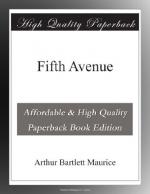Here is a picture of the famous Brown, drawn by the same pen:
“Brown is a huge fellow, coarse in his features, resembling a dressed up carman. His face is very red, and on Sundays he passes up and down the aisles of Grace Church with a peculiar swagger. He bows strangers into a pew, when he deigns to give them a seat, with a majestic and patronizing air designed to impress them with a relishing sense of the obligation he has conferred upon them.”
Later Peter Marie wrote the poem, “Brown of Grace Church,” beginning:
“O glorious Brown! thou
medley strange,
Of church-yard, ball-room,
saint and sinner,
Flying in morn through fashion’s
range,
And burying mortals after
dinner,
Walking one day with invitations,
Passing the next with consecrations.”
This is the eloquent story of Mr. and Mrs. Newly-Rich who did not seek the social chaperonage of the all-powerful Brown. He had been a reputable and successful hatter. She had made vests for a fashionable tailor. By a turn of fortune they found themselves rich. He gave up hatting and she abandoned vests. They bought a house on upper Fifth Avenue and proposed to storm society by giving a large party. The acquaintances of the humbler days were to be ignored. It was guests from another world that were wanted. But instead of going to Brown and slipping him a handsome fee, Mr. and Mrs. Newly-Rich took the Directory, selected five hundred names, among them some of the most prominent persons of the city, and sent out invitations. The first caterer of the town laid the table. Dodsworth was engaged for the music. The result is easy to guess. The brilliantly lighted house, the silent bell, the over-dressed mother and daughter sitting hour after hour in lonely, heartbroken magnificence. But save for its association with the omnipotent Brown, it is the story, not of the sixties in particular, but of any decade of social New York.
It may be worth while to follow the critic from up-state in some of his venturesome explorations of other parts of New York. Those to whom he was to return, those for whose entertainment and instruction his book was written, wanted to hear of the shadows as well as the sunshine. It was the picture of a very sinful metropolis that they demanded, and the author was bound that he was not going to disappoint them.




